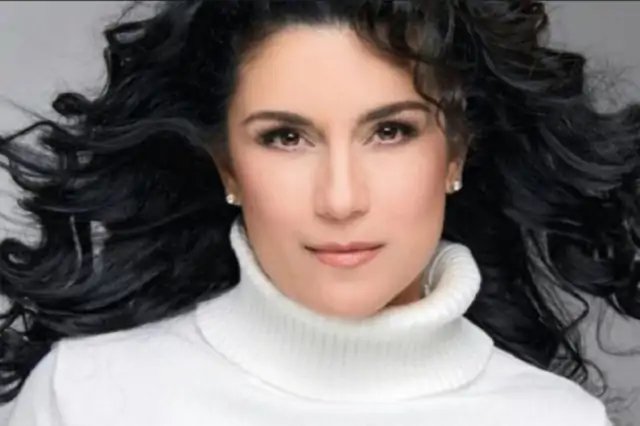Cynthia Karina Moreno Elías

Cynthia Karina Moreno Elías
She is the fourth of five siblings of an Aragonese family, which settled in Venezuela when she was only one year old.
She is fluent in Hebrew, in addition to Spanish and English.
Biography
Karina began to demonstrate a passion for music when she was eight years old, when she started taking organ classes, and imitated the American singer Barbra Streisand at family gatherings.
In high school, she served as secretary of festivities and culture, where she organized Israeli dances in which she also sang and danced.
She entered the School of Social Communication at the Andrés Bello Catholic University, but abandoned her career when she discovered that her true vocation was singing.
She began her career when she participated in an LP: «El Taller del Orfebre» based on Pope John Paul II, where she performed the themes High Heel Shoes, What is Love, Memories, Wedding Song, the last two to Duet with Guillermo Dávila, standing out for his vocal quality and great performance on stage.
In 1984 she signed a contract with the Sonorodven record label, with which, the following year (1985), she recorded her first record production: Amor a Millón[2] from which the singles of: I know how it hurts, To whom, and if I says, I adore you, Save me and Love to a million authorship of the composer Rudy La Scala.
With this album Karina managed to be recognized by both the Venezuelan and Latin American audiences.
"I know how it hurts" was the theme song for the soap opera Carmín broadcast by Venevisión, and the songs A qué y Y si dice[3] me had their respective video clips.
With this album, Karina debuted as lyricist of the song that gave the album its name.
This theme was used as the opening theme for the soap opera Alba Marina[5].
In that same year she was nominated in six categories for the "Ronda" awards, winning the awards for "Best Young Female Revelation Singer", "Best Telenovela Theme" (for I Know How It Hurts), "Best Video Clip" (for Whom) and "Best sold album of the year" (for Amor a million); In addition, the composer Rudy La Scala won for the song I Know How It Hurts.
In 1988 Karina starred in the novel Alba Marina, broadcast by the Venevisión network, along with the members of the group Proyecto M Xavier, Johnny and René, and the actors Elluz Peraza and Daniel Alvarado. In addition, she won two awards "Ronda" for "Best Female Youth Singer" and "Best Video Clip" (for the song La noche es magica composed and produced by Nacho Cano).
In 1989, Karina released the album Desde mi Sueño[6], where she is more mature and much more involved in the process of music production.
In this album she writes the lyrics for two songs: Soni and Lamento de la Jungla.
They were released as singles From my dream, I can't live without love, In love, How can you love and I don't know.
In 1990 Karina temporarily left her career, reappearing three years later at the 1993 Miss Venezuela pageant where she presents her fourth album entitled This is my life, with a new image and a new style.
In this album she composed the songs Ésta es mi vida and I want you to be here.
In 1995, she starred in the soap opera Pecado de Amor with Víctor Cámara; and the following year she released her fifth album, Renacer.
In 1998, with a different image and style, she released her sixth record production, the eponymous “Karina”.
This album did not have the expected success and was withdrawn for several years, during which she dedicated herself to her family and became a representative of her husband, who was trying to enter the artistic world as a producer.
In July 2004 the singer returns with the show "Intimamente Karina", where she performed her songs that made her known in the artistic environment.
In October of the same year she released the album Siempre Karina, after seven years without recording, although the album would not be officially released until April of the following year.
The album was produced by her husband Marcello Azevedo, who by then had already gained experience after working with artists like Chayanne and Paulina Rubio.
The album included re-recordings of her old hits (Be How It Hurts, Save Me, Who, The night is magic, among others) along with seven new songs.
The songs Sin ti and Borrón y Cuenta Nueva were released as singles, which achieved high levels of popularity.
In January 2006 Karina returned to Mexico to participate, as part of the group of teachers, in the Sunday broadcast of Televisa "Singing for a Dream".
She was also part of the cast of musical figures that participated in the broadcast Disco de oro by Televisión Azteca led by José Luis Rodríguez and María Inés Guerra; being in second place after a hard-fought final against the singer Beatriz Adriana.
She married on June 20, 1998, under the Jewish rite, with the Brazilian businessman Marcello Azevedo, a ceremony broadcast by the program Sábado Sensacional.
They have two children, Yasha Marcela, who was born in mid-1999 and Xander, born in 2005.On
April 22, 2016, Karina announced her youngest son's gender transition.
This announcement, published through her accounts on various social networks, changing Hannah's name to Xander Zev




